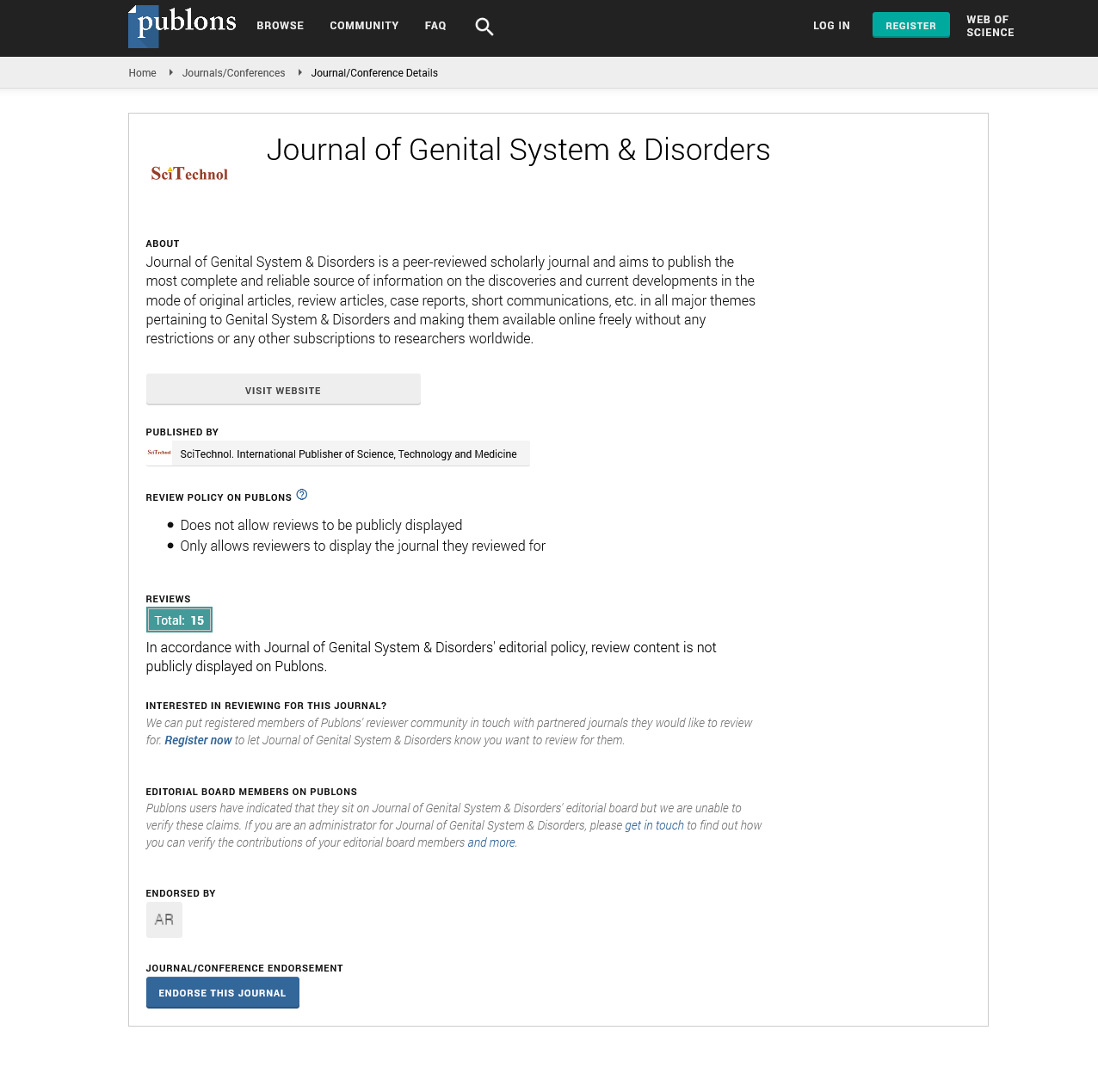Perspective, J Genit Syst Disord Vol: 12 Issue: 1
Sex Hormone Replacement Therapy: Benefits, Risks, and Considerations
Matthew Feldman*
Department of Medicine, University of Glasgow, Glasgow, UK
*Corresponding Author: Matthew Feldman
Department of Medicine, University of Glasgow, Glasgow, UK;
E-mail: feldmanmatthew@gmail.com
Received date: 22 February, 2023, Manuscript No. JGSD-23-96120;
Editor assigned date: 24 February, 2023, Pre QC No. JGSD-23-96120 (PQ);
Reviewed date: 10 March, 2023, QC No. JGSD-23-96120;
Revised date: 17 March, 2023, Manuscript No. JGSD-23-96120 (R);
Published date: 24 March, 2023, DOI: 10.4172/ 2325-9728.1000270
Citation: Feldman M (2023) Sex Hormone Replacement Therapy: Benefits, Risks, and Considerations. J Genit Syst Disord 12:1.
Description
Sex hormones play an importnat role in the development and maintenance of secondary sexual characteristics, as well as in regulating various physiological processes in the body. However, hormonal imbalances can occur due to factors such as aging, medical conditions, or surgical interventions. In such cases, sex Hormone Replacement Therapy (HRT) may be prescribed to restore hormonal balance and alleviate symptoms.
Sex hormone replacement therapy, also known as Hormone Replacement Therapy (HRT), is a medical intervention that involves the use of medications to replace or supplement sex hormones in the body. The most commonly replaced sex hormones are estrogen, progesterone, and testosterone. HRT can be administered through various routes, including oral pills, patches, gels, creams, injections, or implants.
Benefits of sex hormone replacement therapy
Sex hormone replacement therapy can provide numerous benefits to individuals who experience hormonal imbalances. Some of the potential benefits of HRT include:
Relief from menopausal symptoms: Menopause is a natural process in women that occurs usually around the age of 45-55, leading to a decline in estrogen and progesterone levels. This hormonal imbalance can cause symptoms such as hot flashes, vaginal dryness, mood swings, and sleep disturbances. HRT can effectively alleviate these symptoms and improve the quality of life for women experiencing menopause.
Maintenance of bone health: Estrogen plays a critical role in maintaining bone density in women. After menopause, the decline in estrogen levels can increase the risk of osteoporosis, a condition characterized by weak and brittle bones. HRT can help maintain bone health and reduce the risk of fractures in postmenopausal women.
Improvement of sexual function: Sex hormones are essential for sexual health in both men and women. HRT can help improve sexual function by alleviating symptoms such as vaginal dryness, low libido, and erectile dysfunction, which may be associated with hormonal imbalances.
Management of gender dysphoria: Gender dysphoria is a condition where an individual's gender identity does not align with their biological sex. Hormone replacement therapy can be an essential component of gender-affirming care for transgender individuals, as it can help induce the development of secondary sexual characteristics that align with their gender identity, and alleviate gender dysphoria.
Risks and considerations of sex hormone replacement therapy
Like any medical intervention, sex hormone replacement therapy also comes with potential risks and considerations that need to be carefully evaluated before initiating treatment. Some of the important risks and considerations associated with HRT include:
Cardiovascular risks: Studies have shown that long-term use of estrogen and progesterone in women, especially in older age, may increase the risk of cardiovascular events such as heart attacks, strokes, and blood clots. Therefore, it is essential to carefully assess an individual's cardiovascular health and risk factors before initiating HRT.
Breast cancer risk: Estrogen replacement therapy, especially when used for a prolonged duration, may increase the risk of breast cancer in women. Regular mammograms and breast examinations are recommended for women on HRT to monitor for any potential signs of breast cancer.
Prostate cancer risk: Testosterone replacement therapy in men may increase the risk of prostate cancer. Regular prostate examinations and monitoring of Prostate-Specific Antigen (PSA) levels are recommended for men on testosterone replacement therapy.
Individualized approach: Hormone replacement therapy should be tailored to the individual's specific needs and medical history. Factors such as age, overall health, medical conditions, and personal preferences should be taken into consideration when deciding on the appropriate type, dose, and duration of HRT. It is important to work closely with a qualified healthcare provider to assess the potential risks and benefits of HRT and make an informed decision.
Sex hormone replacement therapy can be a beneficial intervention for individuals with hormonal imbalances, such as menopause-related symptoms, gender dysphoria, or other medical conditions. It can provide relief from symptoms and improve quality of life. However, it is important to carefully weigh the potential benefits against the risks and considerations associated with HRT. A personalized approach, regular monitoring, and close follow-up with a qualified healthcare provider are essential to ensure the safe and effective use of sex hormone replacement therapy. If you are considering HRT, consult with a healthcare provider to discuss your individual needs, risks, and benefits, and make an informed decision.
 Spanish
Spanish  Chinese
Chinese  Russian
Russian  German
German  French
French  Japanese
Japanese  Portuguese
Portuguese  Hindi
Hindi 
